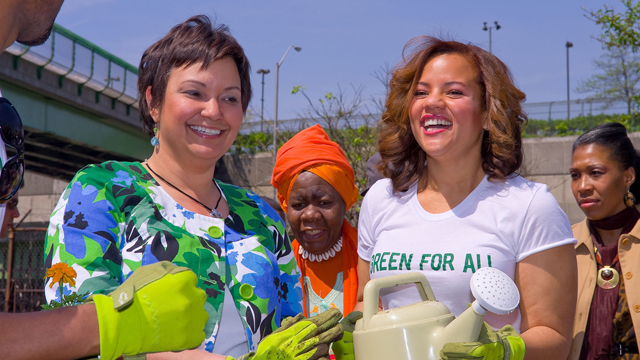
Phaedra Ellis-Lampkins working at an Earth Day garden event with former Environmental Protection Administrator Lisa P. Jackson. (Photo Credit: Green For All)
Phaedra Ellis-Lamkins, 37, remembers when her mother, a single mom who was occasionally on welfare and fed her two daughters with food stamps, got a union job that lifted her family out of poverty. “When you leave that reality of poverty, it is one of the most joyous feelings in the world,” she recalled, explaining why she’s devoted her career to progressive organizing. “The labor movement has been the most effective anti-poverty program in American history.”
After graduating from California State University, Northridge, Ellis-Lamkins worked for Service Employees International Union, organizing home care workers and other low-wage employees. By 2003, at 26, she became the head of the San Jose-based South Bay Labor Council, which boasts 110 unions and 110,000 members. She soon became known as the “the Robin Hood of Silicon Valley.”
Through the Labor Council and Working Partnership (a labor-community coalition that Ellis-Lamkins chaired), she worked to make sure that the area’s dot-com prosperity was widely shared. She led a successful campaign for a local living wage law, helped elect progressives to local offices, pushed local officials to include “community benefit agreements” as part of development projects and joined forces with business groups to form the nonprofit Team San Jose to operate the city’s convention center, civic auditorium and several arts venues in order to guarantee good-paying union jobs.
In 2009, Ellis-Lamkins became head of Green For All, a DC-based group that brings unions and environmentalists together to push for anti-poverty measures and a clean-energy economy. With close ties to the Obama administration, Ellis-Lamkins led the fight to include two key provisions — funds for job training and a focus on green jobs — in the House’s climate and energy bill: Under her leadership, Green For All has helped cities including Portland and Seattle implement green jobs and energy efficiency programs. While focusing on jobs, Ellis-Lamkins recognizes the additional public health burdens confronted by poor and minority communities, where the disproportionate amount of toxic waste is located and high rates of cancer, asthma and other environmental health problems have been recorded. “The racial disparity in toxic dumping continues and federal regulators have not done enough to stop it,” she said.
“Getting people to care about what happens to the planet when they are worried about dinner tonight is one of the greatest challenges we face.”
| « Previous: Teresa Cheng |

